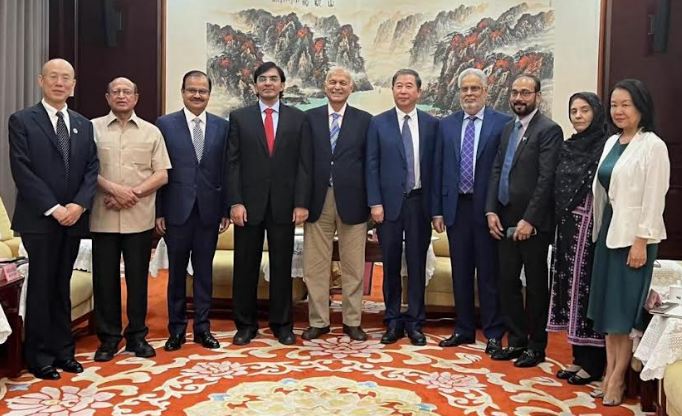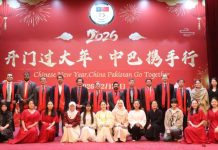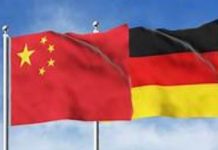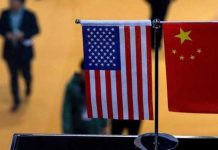DNA
ISLAMABAD, JUL 19: Under the leadership of Senator Mushahid Hussain Sayed, Chairman of the Senate Defence Committee and Pakistan-China Institute, a multiparty delegation of seven parliamentarians which went on a journey to China, the first parliamentary delegation to visit China after the COVID crisis, held a media briefing today at the Parliament House.
The significance of this visit, coinciding with 10 years of CPEC, underscores the commitment of both Pakistan and China to further strengthen the bonds of friendship and cooperation at the people-to-people level, which is the core and foundation of the Pakistan-China strategic ‘all weather’ partnership as ‘Iron Brothers’.
Briefing the media, Senator Mushahid Hussain said the Delegation, “representing 6 political parties from all four provinces, visited China with a three-pronged purpose: a) to reaffirm Pakistan Parliament and political parties commitment to promoting Pakistan-China friendship as the pillar of Pakistan’s foreign policy, irrespective of any changes in Pakistan or the region; b) to learn from the Chinese experience of development and modernisation with a view to imbibing lessons that can take CPEC forward in the second phase; c) to exchange views with Chinese friends on the rapidly changing situation in our neighbourhood so that Pakistan and China can tackle common challenges collectively”.
The parliamentarians included Dr Mahesh Kumar Mallani, MNA (PPP) and Minister of State for National Health Services, Regulations, and Coordination; Mohsin Dawar, MNA, President, National Democratic Movement (NDM), Chairman of the National Assembly Standing Committee on Foreign Affairs; Muhammad Abubakar, MNA, (MQM) Chairman of the National Assembly Standing Committee on Parliamentary Affairs; Ghous Bux Khan Maher, MNA, Leader of (GDA), Dr Nisar Ahmad Cheema, MNA (PML-N), and Senator Sana Jamali, BAP, Convenor, Parliamentary Education Caucus.
During their stay in China, the delegation took part in a series of high-level meetings with Senior Officials of China’s Foreign Ministry, the Publicity Department of the Communist Party of China’s Central Committee, plus leading media outlets and top think tanks for first-hand understanding of the developments and phenomenal progress made in poverty alleviation, technology, education and industry. discussions will delve into vital matters of mutual interest, charting a course for deeper collaboration in several areas.
In the interaction with Chinese friends, Senator Mushahid Hussain underlined 3 key points: a) he thanked China for extending timely diplomatic, military and financial support of $ 5.7 billion loans rollover, which helped save Pakistan from default, including support on Kashmir at G-20 and helping Pakistan get out of FATF listing; b) assured China that ALL political parties of Pakistan, whether in government or opposition, strongly believe China is the pillar and pivot of Pakistan’s foreign policy, and CPEC is the guarantor of a better tomorrow for the people of Pakistan; c) the biggest challenge for both Pakistan and China in the changing regional and global scenario when there is talk of a new Cold War and containment, is information warfare, disinformation and fake news aimed at destabilising CPEC, undermining Pakistan-China ties and the Belt and Road Initiative (BRI).
Since both Pakistan and China share common interests, both sides agreed to forge a collective strategy to meet this major challenge of information warfare at a time when the Chinese vision promotes ‘connectivity and cooperation’ while some with a Cold War mentality in parts of the West and in Asia talk of ‘containment and conflict’. Senator Mushahid Hussain strongly underlined that Pakistan stands with China on the right side of history in building a peaceful and prosperous Asia in the ‘Asian Century’. He also welcomed the recent high-level visits by Pakistan military leaders to China as well as the results of the Joint Cooperation Committee (JCC) on CPEC held recently in Beijing.
He congratulated China on the success of CPEC celebrating its first 10 years. The Parliamentary Delegation’s visit produced the following tangible results: a) to hold an international conference in Islamabad in the first half of 2024 ‘Understanding China, Pakistan & Regional Changes’ in cooperation with the leading influential think tank, China Institute for Innovation & Developing Strategy (CIIDS), and Pakistan-China Institute; b) to hold CPEC Media Forum in the last quarter of 2023; c) to build closer relations between the cities and provinces of Pakistan and China, with a focus on poverty alleviation, agriculture, education, Traditional Chinese Medicine (TCM), women’s development, culture and tourism, technology and media cooperation. The Chinese side reaffirmed their resolute support for Pakistan’s stability and socio-economic development, and both sides also expressed solidarity with their respective core interests.
Some of the comments made by other members of the delegation at the press briefing included:
Dr Mahesh Kumar Mallani, who is from Thar, emphasised the need for enhanced Pakistan-China collaboration in advanced coal technologies to facilitate cleaner and more efficient coal power projects, promoting environmental sustainability and supporting energy security and carbon reduction objectives.
Mohsin Dawar, advocated for enhanced educational cooperation between Pakistan and China, emphasizing a comprehensive exchange program to facilitate students and faculty exchange, particularly with the newly established Roashaan University at Waziristan.
Muhammad Abubakar, who is a former trade union leader, emphasized the need for vocational training cooperation between Pakistan and China and proposed the establishment of joint vocational training institutes.
Ghous Bux Khan Maher emphasized the need for strengthened agricultural collaboration between Pakistan and China based on advanced seed technology and irrigation techniques.
Dr. Nisar Ahmad Cheema urged the establishment of joint research centers with China on Traditional Chinese Medicine by sharing experiences and expertise to enhance medical progress, elevate healthcare results at the grassroots level.
Senator Sana Jamali called for Pakistan-China collaboration on women empowerment, to address challenges faced by women, focusing on poverty alleviation and sister city and sister province arrangements of Balochistan with Chinese provinces and cities.

















